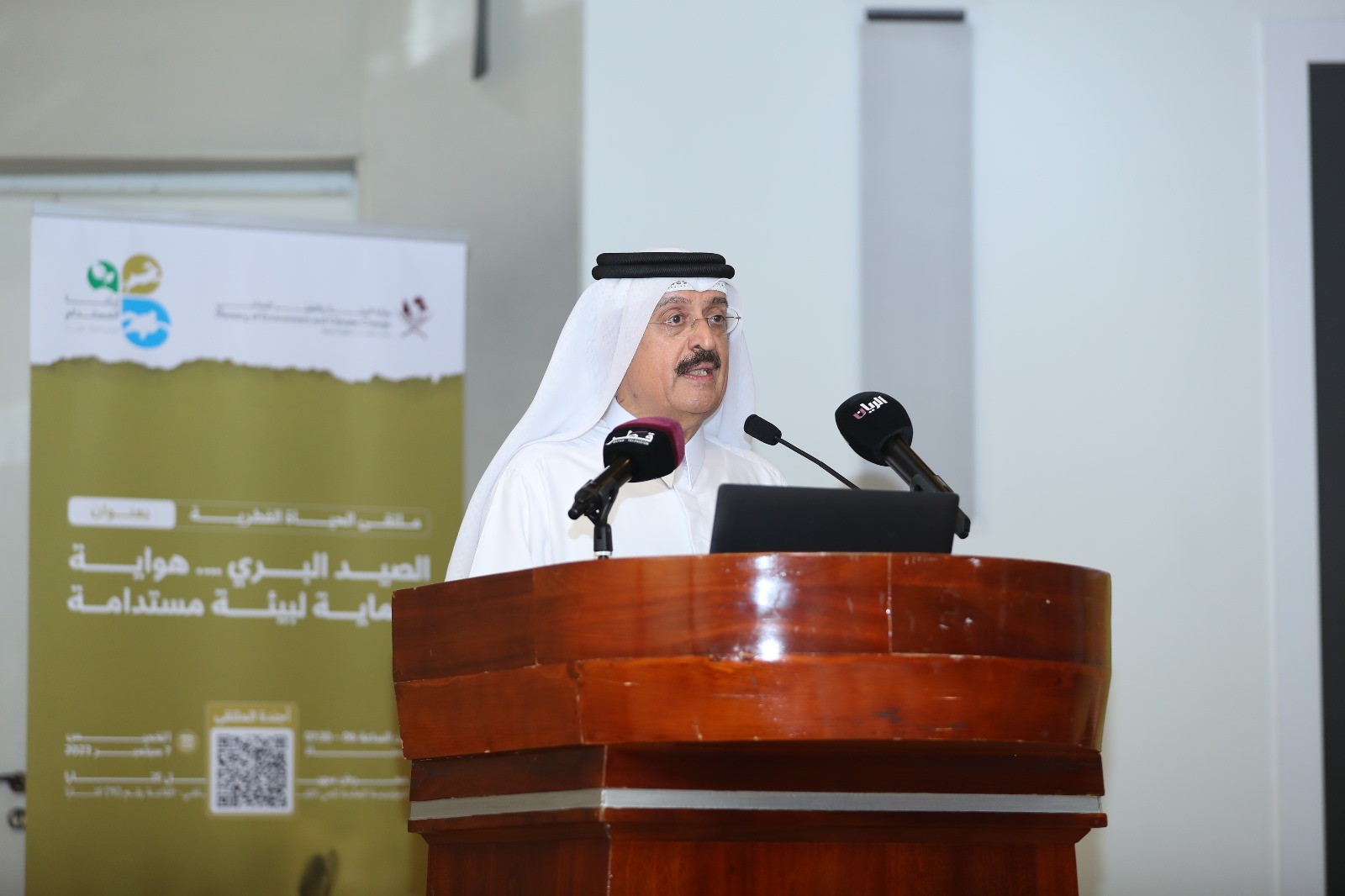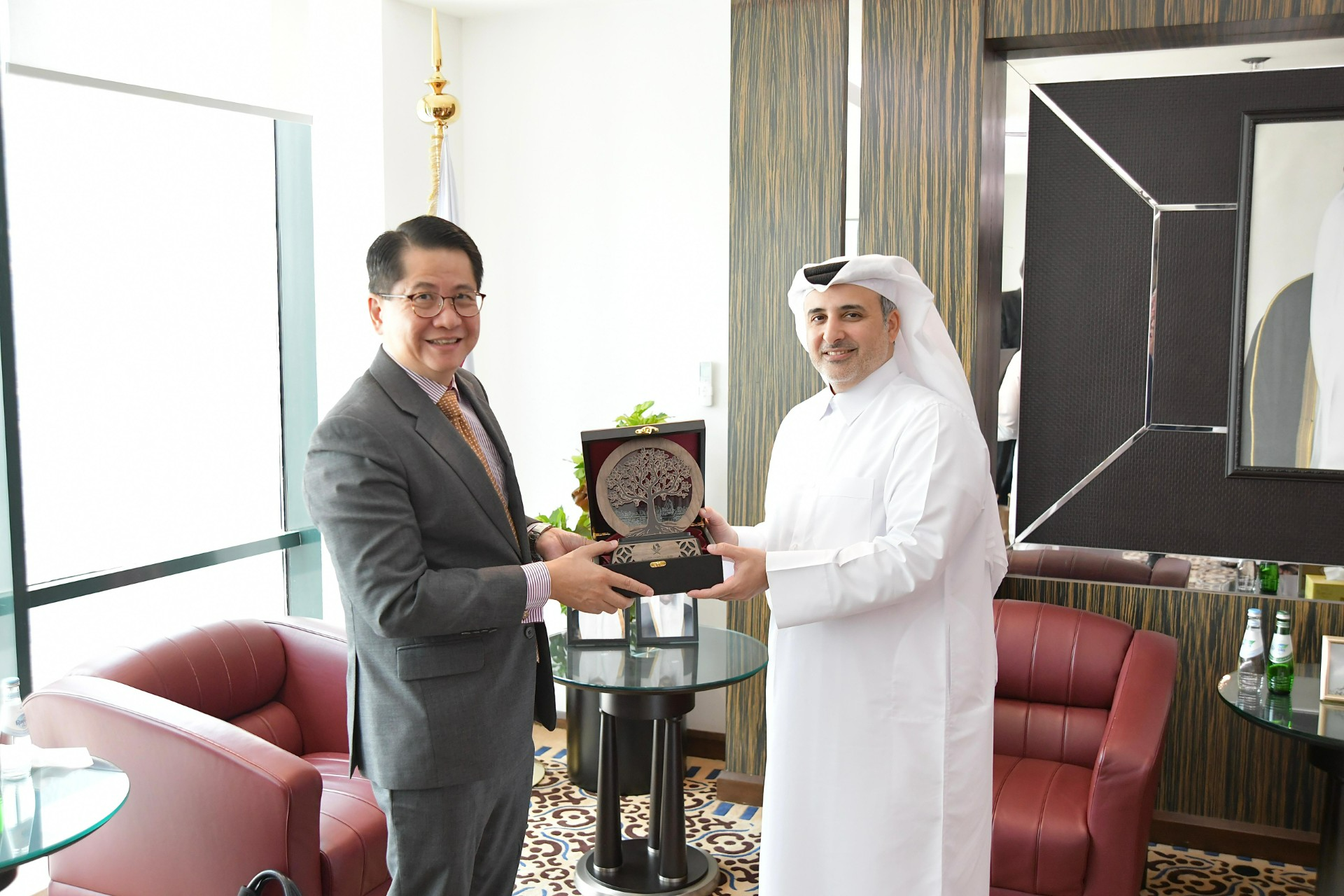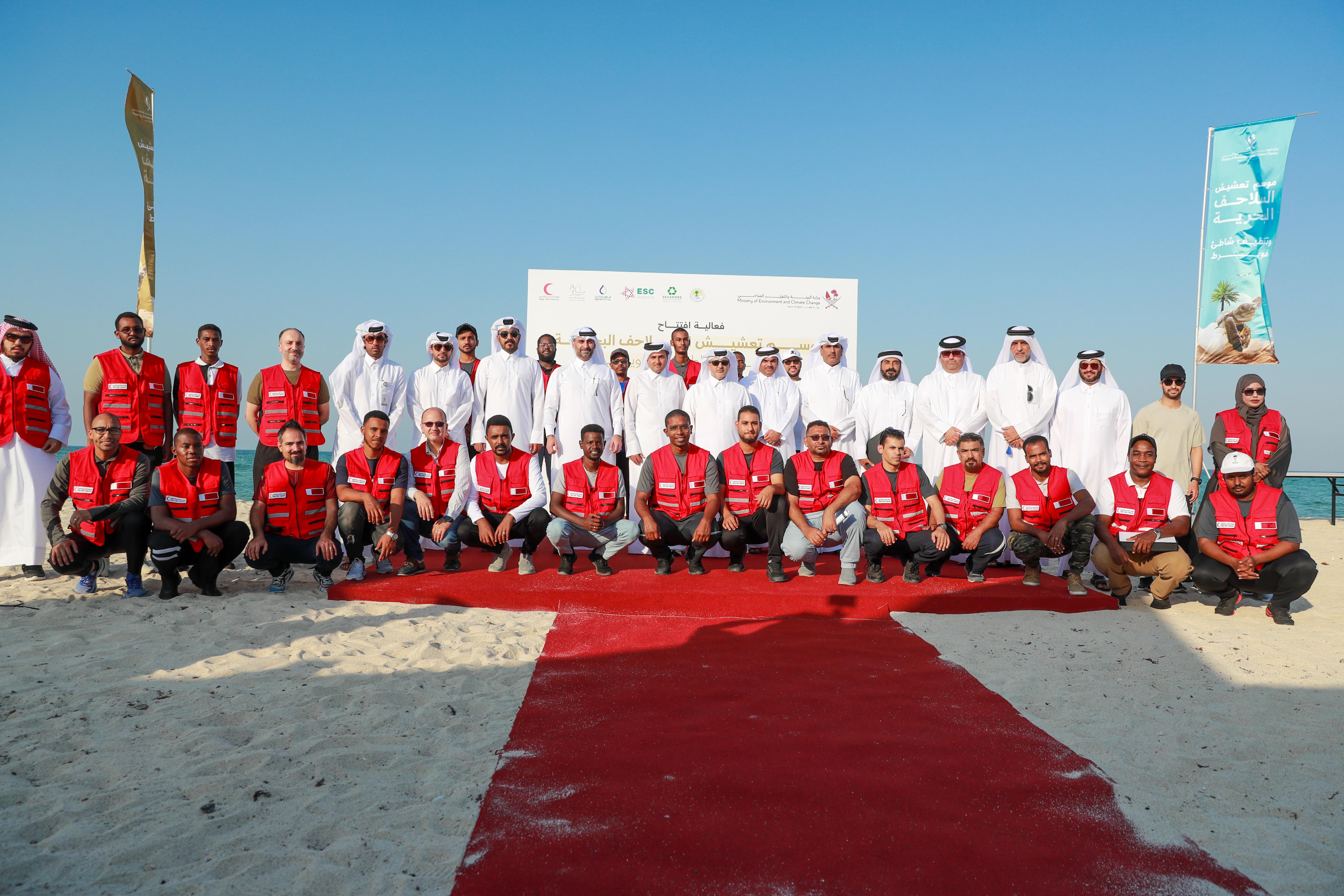
The Ministry of Environment and Climate Change organizes the Wildlife Conservation Forum
The Ministry of Environment and Climate Change organized the Wildlife Conservation Forum under the title “Hunting in the Wild: A Hobby and Sustainable Environmental Protection.” This event coincided with the Suhail – Katara Exhibition and was sponsored by His Excellency Dr. Faleh bin Nasser Al Thani, the Minister of Environment and Climate Change. In its first edition, the forum highlighted the wild rabbit as one of the living creatures in the Qatari environment, under the slogan “The Wild Rabbit: Our Sustainable Heritage, Let’s Preserve It.” The event was attended by officials from the Ministry of Environment and Climate Change, the Qatar Hunters Association, and representatives from some institutions related to the environment and hunting sector.
In this context, Dr. Ibrahim Abdul Latif Al-Muslimani, the Assistant Undersecretary for Natural Reserves Affairs at the Ministry of Environment and Climate Change, pointed out that the ministry is making significant efforts across all levels to address the challenges faced by wild animals in Qatar. These challenges include a recent decline in their numbers due to several factors, most notably illegal hunting, the destruction of their local habitat, and a lack of awareness regarding the importance and role of these creatures in maintaining the natural balance.
Dr. Al-Muslimani mentioned in his speech at the forum that the Ministry of Environment and Climate Change, represented by the Natural Reserves and Protection sector, organized this event with the aim of promoting a culture of environmental sustainability among the Qatari community and raising awareness about the importance of preserving their local environment. This was achieved through the valuable sessions of the forum in which government entities and relevant civil society organizations in the field of environment and wildlife conservation participated.
The Assistant Undersecretary for Natural Reserves Affairs expressed his hope that these sessions would yield several effective recommendations and insights that contribute to environmental conservation. These recommendations should align with the overall goals of the forum and aid in the preservation and sustainable development of the local environment while safeguarding it from any threats.
Dr. Mohammed bin Saif Al-Kuwari, the President of the Wildlife Conservation Forum and the Environmental Expert and Engineering Advisor at the Office of the Minister of Environment, stated: “The organization of the forum coincided with the Suhail – Katara International Exhibition for Hunting and Falcons due to the close and interconnected relationship between the forum’s theme and the exhibition. The forum sheds light on the importance of preserving the wildlife in the Qatari environment from illegal hunting activities and aims to provide guidance, with a focus on the hunting sector, through its sessions.”
Dr. Mohammed bin Saif Al-Kuwari, during his speech at the forum sessions, emphasized that the ministry encourages young and new falconers to follow the traditional approach of preserving the lives of birds and wildlife in the Qatari desert. This aligns with the ministerial decisions regarding the regulation of hunting certain birds and wild animals.
The President of the forum emphasized that the choice of the wild rabbit as the emblem for this year’s event aims to protect and preserve it in alignment with Qatar’s Environmental and Climate Change Strategy, specifically within the second axis of biodiversity. This axis focuses on “enhancing efforts to conserve and restore biodiversity and protect it to create healthy and resilient natural ecosystems, including the preservation of endangered species.
In the same context, Mr. Mohammed bin Abdul Latif Al-Musnad, the Vice Chairman of the Qatar Hunters Association and the Deputy Chairman of the Organizing Committee for the Suhail 2023 International Hunting and Falcons Festival, explained that the Qatar Hunters Association has made it a priority to revive the heritage of falconry. They have done this through various means, including competitions and championships with well-organized rules and conditions, establishing themselves as global leaders in this field.
Mr. Al-Musnad further revealed that the Qatar Hunters Association aims to facilitate participation for falcon breeders through dedicated stages in competitions, with the goal of conserving the natural life of falcons and promoting their breeding in private farms. He also highlighted that the association goes beyond this by providing veterinary care for falcons, supported by the state. Additionally, they have initiated scientific projects such as the Qatar Falcons Release Campaign to release falcons into the wild and the Qatar Falcon Genome Project, which aims to preserve pure and rare breeds and safeguard them from diseases during breeding by producers. In addition to these initiatives, the association organizes a Falcon Veterinary Conference and hosts veterinarians from Central Asian countries, which are among the main sources of falcons, to train them at the Souq Waqif Falcon Hospital.
Sheikh and Islamic preacher Ayesh Ahmed Al-Qahtani affirmed that Islam places great importance on animals and birds in its teachings and guidance. The noble religion encourages Muslims to treat animals with kindness and compassion, as evidenced by various Quranic verses and Hadiths of the Prophet Muhammad (peace be upon him). Islam also emphasizes the significance of preserving the environment in which these animals live, urging Muslims not to cut down trees and plants and stressing the importance of caring for and nurturing them.
In the same context, Mr. Ali Saleh Al-Murri, the Head of the Wildlife Department at the Ministry of Environment and Climate Change, discussed the regulations and laws enacted by the ministry to protect wildlife and its rich biodiversity. He mentioned Law No. (5) of the year (2006) concerning the regulation of trading in endangered species and their products, as well as Law No. (19) of the year (2004) regarding the protection of wildlife and their natural habitats. Additionally, he referred to Law No. (4) of the year (2002) concerning the regulation of hunting of wild animals, birds, and reptiles, and Resolution No. (2) of the year (2008) regarding the regulation of hunting in the Northwestern Region Reserve (Al-Reem). These laws and regulations are vital for safeguarding Qatar’s natural heritage and preserving its wildlife.
The Head of the Wildlife Department emphasized during his speech at the forum the importance of adhering to guidelines for the hunting season set by the Ministry of Environment and Climate Change. These guidelines include respecting the law by understanding hunting seasons, locations, protected species, and allowed hunting tools. Additionally, they emphasize prioritizing sustainability during hunting by selecting species that are allowed to be hunted, respecting set quotas for each species, and using appropriate hunting tools for the targeted species. It’s also crucial to avoid the use of methods and equipment that lead to the capture of multiple creatures at once and to preserve natural habitats while avoiding pollution and destruction. Furthermore, the guidelines emphasize avoiding illegal hunting and refraining from using tools that may cause serious harm or slow and painful death to animals. Observing safety rules, respecting the rights of others, and practicing ethical hunting are essential aspects to ensure that hunting always remains humane and ethical. These guidelines are instrumental for responsible hunting and wildlife conservation efforts.
Dr. Sameh Awada, an expert at the Ministry of Environment and Climate Change, pointed out that the autumn season is the most suitable time for bird hunting, extending from September to the end of December, compared to the spring season, which spans from March to the end of May. He emphasized that most resident birds breed during the spring, making it essential to avoid hunting during this season due to the difficulty of distinguishing between migratory and resident birds. Resident birds play a crucial role in seed dispersal and pollination during the spring, so a decline in their numbers could have a negative impact on the environment.


